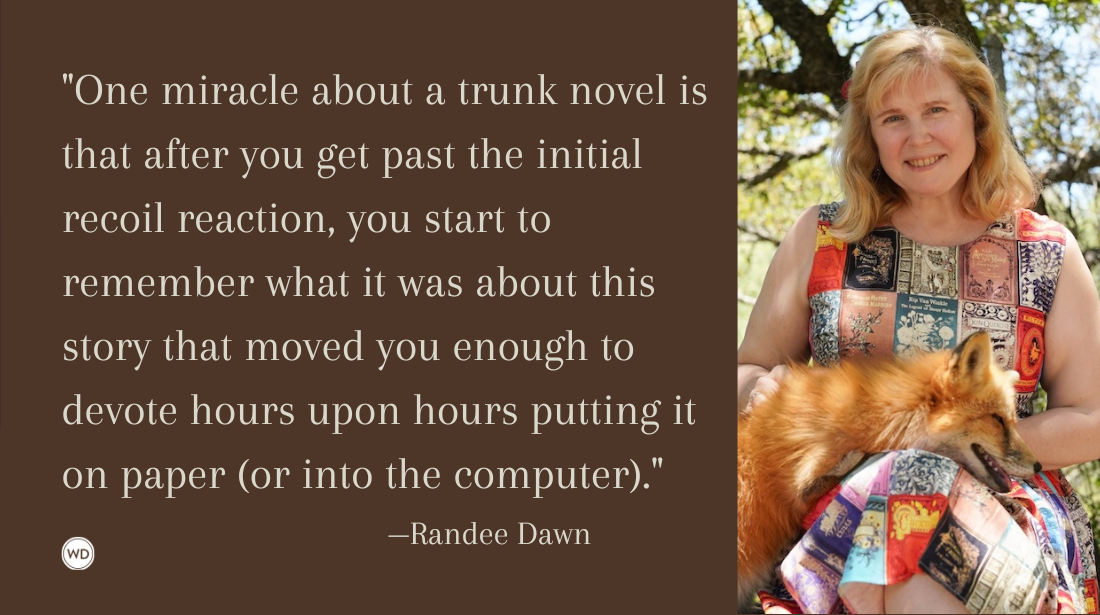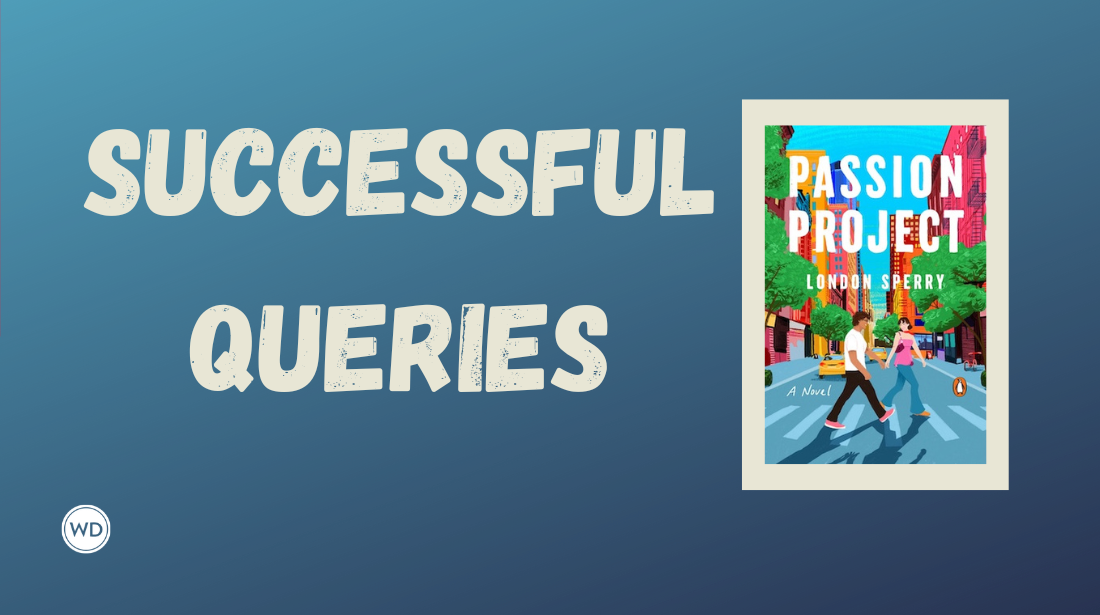13 Reasons Why You Shouldn’t Sign That Book Contract or Take That Freelance Writing Job
In a competitive industry, it’s easy to feel like publishers hold all the power. But the truth is they need good content—and writers have a right to not be fleeced. Here are some situations when the best option just might be to walk away from that book contract or that freelance writing job.
The following article first appeared in Writer's Digest magazine. Subscribe today to get the inspiration and advice you need to succeed as a poet, novelist, journalist or screenwriter.
In a competitive industry, it’s easy to feel like publishers hold all the power. But the truth is they need good content—and writers have a right to not be fleeced. Here are some situations when the best option just might be to walk away from that book contract or that freelance writing job.
When I was first starting out as a fledgling fiction writer, for a while I gave stories away for free. I did this because I was young, and I’ve never claimed to be particularly bright, so the idea that someone would pay me for my words seemed laughable. Here’s how I thought things worked:
Step 1. Work on story for months.
Step 2. Give work away to zine or website.
Step 3. ????
Step 4. Profit!
The fact is, there’s just as much of a learning curve on the business side of writing as on the craft side. Fortunately for us, a lot of craft-centric writerly wisdom can be boiled down to pithy, easily remembered phrases—like avoid passive voice; or show, don’t tell; or never explain plot twists with the sudden, unexpected introduction of poorly conceived time travel—and you can make major headway on your story craft by simply reading other people’s work. Business wisdom, unfortunately, is not so easily accessible. Craft goals converge slowly with the business side of writing, and many writers believe publishers are doing them a favor merely by printing their words.
But that’s wrong.
Publishers need our words. Desperately. So desperately they will pay us for them—and pay well—because they have an infinite void to fill. Their business is content and we are the suppliers. Our work has value—real, economic value. Once hit with that epiphany, you realize that a good editor is actually more business partner than boss. Good editors respect what you, as a writer, bring to the table. And that respect is traditionally expressed via cash money. Which is why one of the first business lessons a writer learns is money flows to the writer, or, put another way, don’t work for exposure—people die from exposure.
As with most universal axioms, actually putting that advice into practice can be a bit more complicated because, as any working writer knows, this career isn’t for the faint-hearted. When offered a book contract or an ideal freelance gig, it’s easy to be blinded by the opportunity—
especially when you’re just starting out and trying to build a résumé, or looking for any way to get your words into readers’ hands.
You have to remember: Publishing is a business, contracts are always negotiable and not every opportunity is worth your time. Sometimes the reasons to not sign that contract or take that job are easy to miss. Here are 13 less-obvious grounds to walk away from paying jobs and publishing offers in both fiction and freelance writing.
Fiction
When an acquiring editor expresses interest in your manuscript, it’s easy to be wooed by the simple idea that someone wants to publish your work. But just because a book contract comes with an advance and royalties doesn’t mean it’s a good deal. These are some easy-to-miss warning signs:
1. The Greedy Grabber
If a book or story contract comes with a payment, you might think you’ve already won. But you should only be selling specific rights to your work, and if the publication wants more, you should be properly compensated. For example, I once sold a short story for $150 to a magazine only to discover that in the contract, they were claiming just about every sub-right under the sun—including the film rights. That means if they managed to get a movie into production based on my story, I wouldn’t see a dime, even if the film budget was hundreds of millions of dollars. I passed.
2. The So-Called Publisher
It’s pretty easy to call yourself a publisher, and some small presses offer modest advances on novels. Nothing wrong with that, and under a standard royalty arrangement you should be proud to publish your book even if the company is small. That said, the indie press must be able to perform the basic functions of a publisher—editing, design, distribution, marketing. Be sure to research any company offering you a contract and make sure they have the bandwidth to follow through with your expectations—as not all do.
3. Pay-to-Play
Some small houses push all the work onto their authors out of simple, honest incompetence. Other so-called publishers are more upfront about it, putting language in their contracts requiring you to do the work a publisher traditionally takes care of. If you’re contractually required to proofread, edit and act as your own salesperson, you’re not being published—you’re being hired.
4. The Other Pay-to-Play
When looking for markets that publish short fiction, you’ll likely encounter magazines or websites—some well-known and respected—that charge a small submission fee, typically less than $5. They may justify this by saying that their staff are volunteers, that reading submissions takes a lot of time, that they’re doing this for the love of literature, etc. The problem? They’re still using your words to sell subscriptions and advertisements. Submission fees turn publishing attempts into a lottery, and should be all the reason needed to take your valuable words elsewhere.
5. In Print In Perpetuity
In publishing, relationships aren’t necessarily forever, which means that someday (perhaps sooner than you think), you’ll need to get back those rights to your book. While not as common as it was a few years ago, any contract that doesn’t specify when your book is considered officially out of print should be rejected—after all, when you publish something you’re selling a license, and eventually the rights should come back to the author. In the old days, publishers had to actually print physical copies, which was expensive, so clearly defining “out of print” was pretty simple. But in the digital age, your book can technically be available forever, at no cost to the publisher. So make sure there’s a provision for getting those rights back if the publisher stops promoting or actively distributing your work.
6. Irrational Ratios
When you make your first book sale for real, actual dollars, it feels like you’ve finally arrived—but just because you’re getting paid doesn’t mean you’re getting paid fairly. Read your contract to see what you’re giving up and what you’re getting compensated for. I was once offered a contract that specified token payments for subrights no matter the budget—meaning I got a tiny, fixed amount of money whether a deal for a movie or other adaptation was for $100 or $1 million. When they refused to change that language, I walked away.
Freelance
Whether you’re hunting freelance assignments at Mediabistro or ProBlogger, or cold-pitching an editor at a magazine, freelance writing is all about the hustle. But in the midst of seeking out assignments, you might be overlooking little details that are actually huge red flags.
7. We Don’t Discuss Filthy Lucre
Money is always an awkward topic for writers, but there’s one golden rule: Money has to be part of the conversation. If it’s an ad for a freelance gig, the complete absence of rate information is a concerning omission. If you’re pitching an editor and they tell you to go ahead and write the piece but don’t mention payment terms, chances are they don’t value writers very much, because they either think it’s not important (despite the fact that, you know, you make yourliving this way) or—worse—because they think you won’t notice.
8. Get the Filthy Lucre in Writing
Something else freelance writers need aside from payment is a contract that spells out all the specifics—including a kill fee that protects the writer from putting in all that leg work only to see the piece pulled at the last minute. A refusal to put terms in writing is in and of itself a major warning sign.
9. The Step Down
On the other hand, no matter how many clips you have under your belt, not every gig that seems interesting is going to offer your desired rate (and just because you suggest a rate in a cold pitch doesn’t mean your editor is going to agree to it). There’s an argument to be made that steady, enjoyable work is always worth considering—but keep in mind that once you agree to a rate, you’re kind of stuck there. Sure, you could ask for a raise later, but rates have a way of getting sticky over time.
10. It’s a Hard-Knock Life
You click on a posting only to find a depressing list of the many ways you will probably irritate and disappoint your Freelance Overlords. Or you cold-pitch an idea to an editor, and although they like the concept, their response is a recitation of your copious responsibilities (only a few of which will involve creating words). In both cases, there’s likely to be a lengthy lecture on the ways your work can (and probably will) be rejected. This is another situation in which a contract that clearly sets out your services, pay and expected deliverables will serve you well.
11. The Freebie
This is a bait-and-switch. You see a job on the boards that looks compelling, or an editor actually pitches you with an idea for ongoing work. In both cases the rate is fine—but you’re asked to supply a few thoughtful, fleshed-out pitches, or even full-scale articles. It might seem reasonable … but you know what else is reasonable? Paying writers for their time, even if it’s a test project. At worst, it’s a scam for free content. At best, it indicates the editor doesn’t value your time.
12. Goldilocks Syndrome
Good news, everyone! There’s a posted rate or range of pay that’s in your Green Zone. The problem? The job description reads like a fever dream of marketing buzzwords and indistinct concepts, making it impossible to figure out whether the rate’s fair or not. Or you get a positive response to a pitch, but it’s so lengthy and specific it’s basically the article itself, meaning you’ll never hit the sweet spot the editor is looking for—they’d be better off just publishing their version.
13. The Terrible Words
Any mention of “copyscape” or “plagiarism” should have you running. Editors have a right to protect themselves from plagiarism, and if they choose to process every submission through a plagiarism-protection algorithm, that’s fine. But putting it in the advertisement or explicitly mentioning it (seven or 15 times) in pitch correspondence means they think of writers as goldbrickers seeking to rip them off. And that gives you an early glimpse of what your working relationship with them will be.
Turning down a paying job or publishing opportunity is never easy, especially if you—like many authors—lack the advanced time-travel technology that would allow you to go back and rectify mistakes. If the opportunity truly seems too good to pass up, there’s no harm in marking up a contract (if you’re not well-versed, remember to always have your contracts reviewed by someone familiar with publishing or freelance legalese). Legitimate companies will at least attempt to be accommodating or arrive at a compromise, because they know that they need you—and the words you’re capable of supplying.
Jeff Somers began writing by court order as an attempt to steer his creative impulses away from engineering genetic grotesqueries. He has published nine novels, including the Avery Cates Series of noir-science fiction novels and the Ustari Cycle series of urban fantasy novels. His short story “Ringing the Changes” was selected for inclusion in Best American Mystery Stories2006; “Sift, Almost Invisible, Through” appeared in the anthology Crimes by Moonlight, edited by Charlaine Harris; and “Three Cups of Tea” appeared in the anthology Hanzai Japan. He also writes about books for Barnes & Noble, and the craft of writing for Writer’s Digest which published his book Writing Without Rules in 2018. He lives in Hoboken with his wife, The Duchess, and their cats. He considers pants to always be optional. Follow him on Twitter @jeffreysomers.








